5 April 2018
The reason why I studied MMD and not the master Biomedical Sciences, is because I already knew what I was interested in (cancer and immunology) and these two subjects were a big part of the theoretical courses of MMD. Moreover, this study provided me with another opportunity to do an internship abroad, in my case San Diego. There, I went to a lecture on whales and I won a book on whales and dolphins, by winning a quiz. I told you I was still into marine animals!
b) Theater or cinema? : Cinema
c) Dine out or dine in? : Dine out
d) Ferrari or Fiat? : Fiat
e) Shopaholic or chocoholic? : Shopaholic
f) Culture or Nature : Nature
 My name is Jolien Van der Meer, I’m a Dutch PhD candidate working at the Dept. of Laboratory Medicine, Laboratory of Hematology in the Radboudumc. My PhD project belongs to the themes Cancer development and immune defense and Women’s cancers.
My name is Jolien Van der Meer, I’m a Dutch PhD candidate working at the Dept. of Laboratory Medicine, Laboratory of Hematology in the Radboudumc. My PhD project belongs to the themes Cancer development and immune defense and Women’s cancers.
When you were a kid what did you want to be when you grew up? Can you tell us something about your child years.
I was a very curious (always asking ‘why?’) child and eager to learn. When other children were playing, I was reading books and I couldn’t wait to go to the first grade, to finally start learning things. When I was a kid, I wanted to become a dolphin trainer. I still love dolphins and other marine animals, but I think a PhD fits better with my interests and ambitions. When I was growing up, I wanted to be a teacher. I have kept interest in teaching, which I am doing now by supervising students in the lab. Hopefully, in the future, I can also educate students at the university.What was your previous academic training, where did you study and why that study?
I studied here in Nijmegen. I did the bachelor Biomedical Sciences and the master Molecular Mechanisms of Disease (MMD). I chose for Biomedical Sciences because I wanted to study something that had to do with medicine, but I knew I did not want to become a medical doctor. Now, I will become a different kind of doctor. During my bachelor, I followed the Medical Honours Programme, which gave me the opportunity to perform my bachelor internship in Badalona (close to Barcelona).The reason why I studied MMD and not the master Biomedical Sciences, is because I already knew what I was interested in (cancer and immunology) and these two subjects were a big part of the theoretical courses of MMD. Moreover, this study provided me with another opportunity to do an internship abroad, in my case San Diego. There, I went to a lecture on whales and I won a book on whales and dolphins, by winning a quiz. I told you I was still into marine animals!
The RIMLS motto is “Today’s molecules for tomorrow’s medicine”. What does this mean for you?
For me, it means that we have to keep in mind that we are doing our research to help patients in the end. My project is on developing immunotherapy for ovarian cancer that can be used in a clinical trial. This motivates me every day to keep going! Here at the Laboratory of Hematology we have close contact with clinicians at the Department of Hematology, who provide us with great advice on our projects from their perspective.Who is your great example as scientists? And please give a motivation why.
I admire Jon van Rood. He was a Dutch immunologist and he unraveled the complexity of the human leukocyte antigen (HLA) system. This has had a big impact on transplantation medicine and led to more insight into how infections and auto-immunity can develop. He was also involved in the first stem cell transplantation, which is the first type of immunotherapy.Which research discovery that you have made has made you most proud?
I am working hard to be able to answer this question!Given unlimited finance what experiment would you perform?
I would treat ovarian cancer cells with different combinations of compounds and perform ‘omics’ experiments like transcriptomics, proteomics, metabolomics, epigenomics etc. When the analysis is done, I would like to perform a clinical trial with the best combination.What does your working area (desk, office) look like and what does it say about you (or your research)?
My desk is quite empty and organized. I hope it says about me that I like order and that my research is accurate.Nominate a colleague to be in the spotlight and what would you like to ask him or her?
I would like to nominate Estel Collado-Camps and ask her what her favorite Dutch tradition is as a Catalan.What type of person are you, quick insights:
a) Mac or PC? : Macb) Theater or cinema? : Cinema
c) Dine out or dine in? : Dine out
d) Ferrari or Fiat? : Fiat
e) Shopaholic or chocoholic? : Shopaholic
f) Culture or Nature : Nature
Related news items
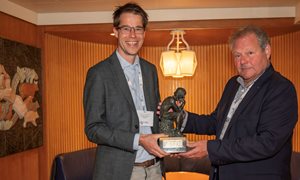
Dutch Society of Clinical Chemistry Science & Innovation Award for the team of Hans Jacobs
14 June 2022 The team of Hans Jacobs pioneers on the development of personalized diagnostics to measure minimal residual disease in patients with multiple myeloma. go to page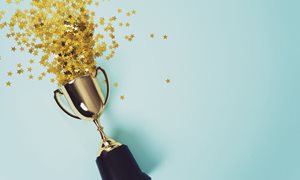
RIMLS awards call for nominations
19 October 2021 RIMLS awards several prizes to stimulate and honor our (young) researchers. Upcoming awards are Supervisor of the Year, Best Master Thesis, Best Publication, Best Image and more. Send your nominations now before 24 November 2021. go to page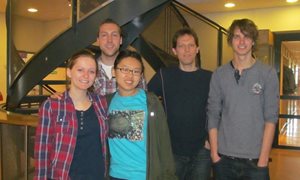
Miniaturized microfluidic platform for automated epigenetic profiling
6 May 2021 Together with Fluidigm, a US-based company focusing on microfluidics, the team of Hendrik Marks publishes in Genome Research the development of a powerful plug and play ChIP-seq platform for minute amount of cells, such as embryonic specimens or small biopsies. go to page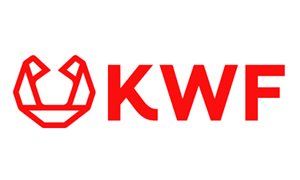
2.5 million Euros for cancer research into ovarian cancer and immunotherapy
15 April 2021 The Radboudumc receives 2.5 million Euros from the Dutch Cancer Society (KWF) for three studies to ensure oncological progress during COVID-19 period. go to page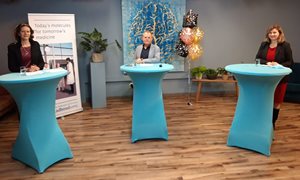
RIMLS online award ceremony proudly presenting the winners
13 January 2021In this special webinar of the RIMLS New Year Celebration, scientific director René Bindels reviewed 2020 and looked forward to 2021. But more importantly a number of researchers received prizes in the traditional RIMLS awards ceremony.
go to page
